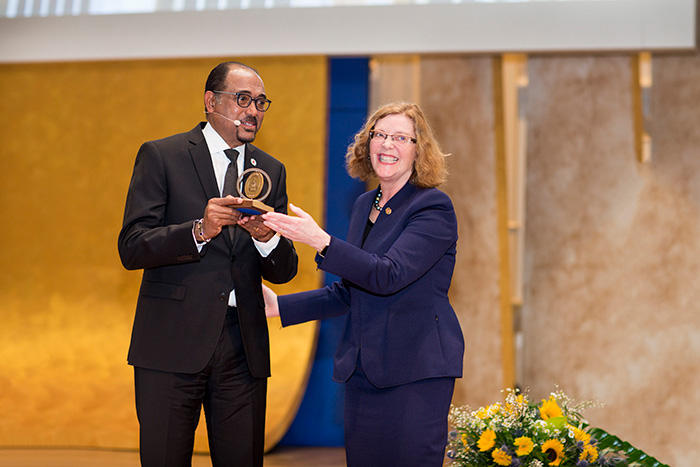Experts in HIV, cancer and mental health highlighted Emory’s leadership in disciplines of critical global importance at Tuesday's Inauguration Academic Symposium, titled "Health Challenges and Bold Opportunities."
In a brief introduction, President Claire E. Sterk said the symposium topic “symbolizes what Emory stands for because it captures not just what we know in terms of content, but the way in which we care about the world and the way we care about people.”
“We make so many contributions,” Sterk said. “One of the areas in which we are extremely strong is health, in the way we work to make the world better, to make people’s lives better. We focus on improving access to care, removing health disparities, working to prevent diseases and to understand emerging disease.”
Carlos del Rio, Hubert Professor and chair of the Department of Global Health at the Rollins School of Public Health and professor of medicine in the Division of Infectious Diseases at Emory School of Medicine, served as moderator for the symposium, held in Glenn Memorial Auditorium.
Panelists included Michel Sidibé, executive director of UNAIDS, the Joint United Nations Programme on HIV/AIDS, and under-secretary-general of the United Nations; Deborah Bruner, associate director for mentorship, education and training at Winship Cancer Institute and professor in the Nell Hodgson Woodruff School of Nursing and Emory School of Medicine; and Elaine Walker, Samuel Candler Dobbs Professor of Psychology and Neuroscience at Emory College and director of Emory’s Development and Mental Health Research Program.
An end to AIDS by 2030?
Introducing Sidibé, del Rio asked him to elaborate on what it will take to achieve the goal of ending the AIDS epidemic by 2030.
“Just a few years back … when you were traveling anyplace in Africa, hospitals were full of people dying, and we never would have dreamed of the treatment that is now available,” Sidibé said. He added that HIV/AIDS research and treatment changed when social and scientific movements moved HIV from “an issue of ‘you’ to an issue of all of us.”
In large part because of breakthroughs pioneered at Emory, treatment of HIV progressed from taking more than a dozen pills a day to one a day and “soon to one injection every four months,” said Sidibé, who noted that those working to end the epidemic must continue to challenge paradigms in HIV treatment.
"The success stories are there. We have been able to reduce new infections, we have been able to reduce the mortality of this epidemic, but we still have a challenge. We know if we want to achieve this vision of ending this epidemic by 2030, we need to address more of the underlying causes,” said Sidibé.
He cited education of HIV-positive mothers whose children are born free of HIV and who adhere to treatment to prevent transmission during breastfeeding; the need to address increasing infections among adolescent girls in developing countries who lack access to testing and treatment; and the importance of reaching at-risk populations, including men who have sex with men, drug users and sex workers.
“In 35 years of fighting this epidemic, we still have 45 percent of people who don’t know their status,” Sidibé said. “When we have 90 percent who know their status, we want 90 percent of those who are positive to be put on treatment. And 90 percent of those people who are put on treatment, we want to make sure we monitor their viral load.”
The future of cancer treatment
Bruner presented “Challenges in Cancer: Moonshots, Miracles and Myths.”
“For all the good news we have in cancer, there are still many, many challenges and here are just two. Things like better treatments in HIV have caused populations that used to have short life spans to now have longer life spans. That is the good news. The bad news is that, if you live long enough, you get your cancer,” Bruner said.
Given that many cancers occur in patients age 50 and older, they are often managing multiple chronic diseases, and treatment costs can be prohibitive. In the case of new precision medicines, immunotherapy treatments and other “miracle” drugs, exorbitant costs may place those drugs out of reach for the small populations for whom the medicines are an option, Bruner said.
“We have found immunotherapy drugs to treat a mutation in 10 percent of patients with lung cancer who would have died, but who were cured. That is amazing, miraculous, but only 10 percent of lung cancer patients have that mutation and only 10 percent of that 10 percent experience the miracle. In most cancers, we have not identified a mutation," she said.
Many new precision and immunotherapy medicines also have long lists of side effects. Asked Bruner, “Would you trade nausea and vomiting for more time to live? Of course, but some of these drugs … can kill the patient, so you die from the drug, not the disease. And many side effects are long-term, persistent and terrible.”
She emphasized the importance of changing our focus, saying, “These side effects have gotten not enough attention. In addition, many of the drugs … are unbelievably costly, so we worry terribly about adherence and patients’ ability to take these drugs. We need to look at the person wrapped around that tumor.”
Although Emory makes significant contributions in drug discovery and immunotherapy, Bruner feels that the university can also become a global leader in implementation science, interdisciplinary collaboration and comprehensive patient care.
“Not only should we be doing all these things, but we could do something that no one else is doing. Not a penny of the moonshot is going for care and compassion. Almost all federal and drug dollars go for technology and gene sequencing and new drugs. We need them, they are important, they are miracles, but we need care and compassion,” she said.
From heart to head
Walker focused on the global burden of mental illness and how addressing it will depend on a shift in research and attitudes surrounding mental illness and substance abuse.
“Mental illness and substance-use disorders have become much more prominent in research and public health and epidemiology, and there is an increasing emphasis on morbidity rather than solely mortality of mental illness and substance-abuse disorders,” Walker said.
“We know that, globally, mental disorders, including mental illnesses and substance abuse disorders, account for 13 percent of the total disease burden,” Walker said, adding that mental illness and substance abuse are often co-morbidities. “As it turns out, mental and substance-abuse disorders are associated with a larger proportion of the global burden of health and disease than most communicable disorders.”
The burden of mental illness and substance-abuse disorders is compounded by the stigma that people dealing with them often encounter, the lack of a cure and the early onset of many mental disorders.
“Perhaps the most tragic aspect of mental illness is the fact that these disorders typically have their onset in adolescence or early adulthood. These are relatively early-onset disorders with relatively low mortality compared to other illnesses, but high disability because individuals are likely to live such a large portion of their lives with the illness,” Walker said.
Mental illness in adolescence, though, presents the “bold opportunity” to identify at-risk youth as early as possible through both clinical channels and brain research into the prodromal period, the period before the onset of mental illness.
Emory is a partner in the North American Prodromal Longitudinal Study, a nationwide partnership between research universities and organizations dedicated to predicting the onset of psychotic disorders, particularly schizophrenia, and learning more about the underlying brain changes leading to their onset.
“We need to intensify research on adolescent brain development," Walker said. "Twenty years ago, it was not uncommon to hear it said that there does not seem to be much change in the human brain beyond early childhood. We now know, in fact, that adolescence appears to be one of the most profound periods of brain development in the human lifespan. The brain is being reconfigured, setting the stage for new abilities and new capacities, but unfortunately also setting the stage for the possible onset of mental disorders."
Honoring a global health champion
At the conclusion of the program, Sterk presented Sidibé with the first Emory President’s Medal of her tenure for his more than 30 years in public service, including service to UNAIDS and UNICEF and advancing health in his native Mali, where he worked on behalf of the nomadic Tuareg people.
“I don’t know if I deserve it, but I will accept it in the names of people who are not in the room, people who we fight to give a voice to and to give them a possibility to have a better life,” Sidibé said.




